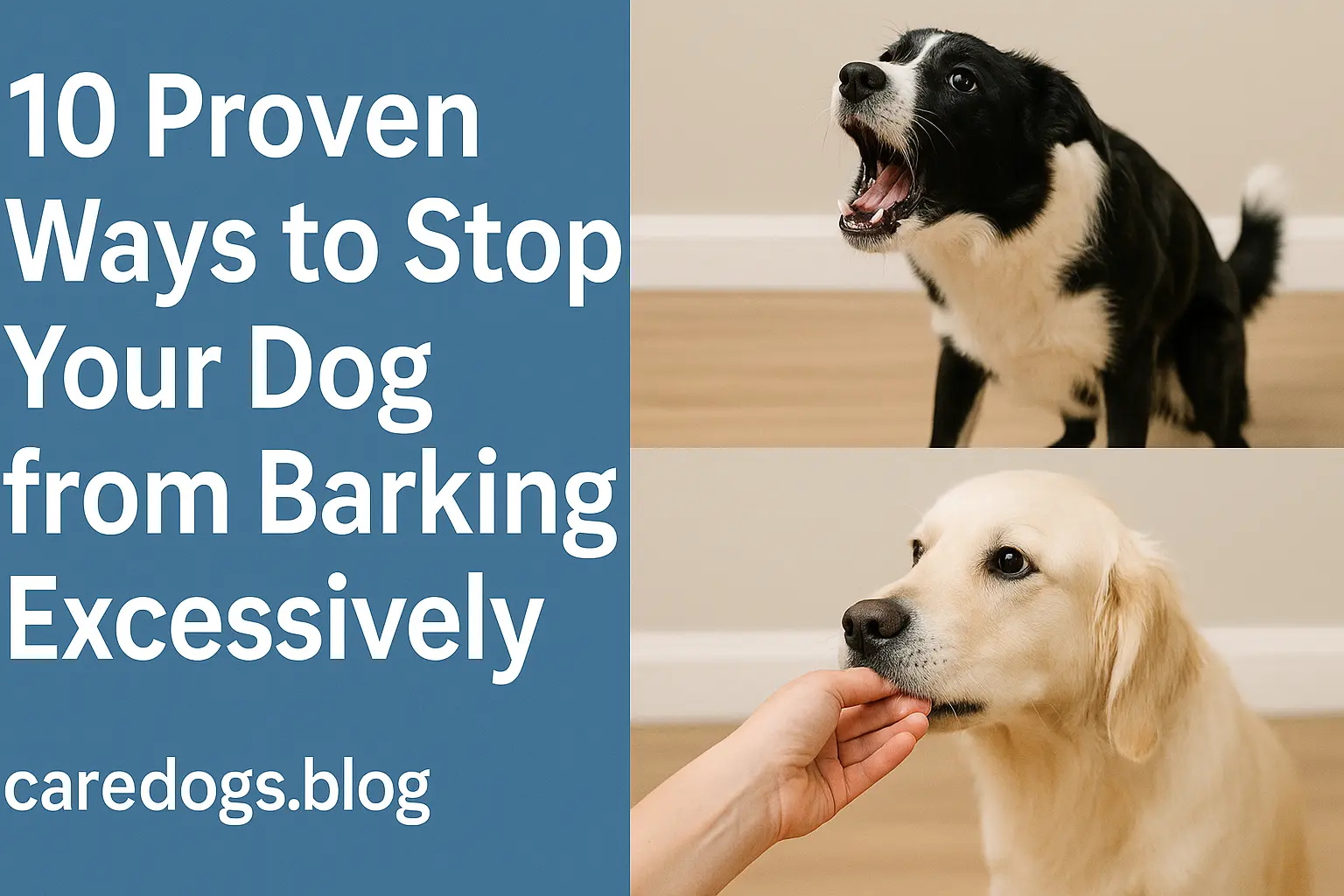10 Proven Ways to Stop Your Dog from Barking Excessively
10 Proven Ways Dogs bark that is their form of expression. When their incessant barking turns persistent, it can test your patience and try your patience with your beautiful pet. 10 Proven Ways Whether caused by passersby or strangers, noises, nothing to do, or anxieties about being separated, 10 Proven Ways incessant barking is a concern shared by all owners of dogs.
Good news: You can train your dog to listen and not always bark using proper training and consistency. Below is a step-by-step guide of 10 effective ways of making your dog stop disruptive behaviors and the recommendations on making your home peaceful and joyful.
1. 10 Proven Ways Determine Barking is Happening
10 Proven Ways In orders to discovers the solutions of the issues you have first to identify the causes of the issues. Dogs tends to bark because of a lots of reasons likes
- Territorial barking – Protecting home or yard
- Attention-seeking – Desire playtime, treats, or affection
- Fear or Anxiety – Sounds dstrangers or abandonment alone
- Boredom – Impairment of mental or physical stimulation
???? Expert Advices Keeps a diary of where and when your dogs is likely to bark the loudest. That way you can then go after the causes and not the symptoms.
2. Don’t Reward the Barking
Another very common error committed by owners of canines is unwittingly reinforcing the barking. That is, if the pup whines to be given a snack and you do give it a snack, then it has learned that whining earns it treats.
Instead:
- Ignore the barking until your dog is quiet.
- Reward them with treats or attention only when they are calm.
This will make your dog avoid barking rather than being rewarded.
3. Train the “Quiet” Command
One of the very effective ways of training a dog to understand and respond when it is “Quiet” is defined below.
- Get your dog to bark once or twice.
- Say “Quiet” softly in a gentle yet firm tone of voice.
- When they are silent briefly or at all, reward with praise and a treat.
- Repetition often until they associate “Quiet” with silence.
With practice, the dog will realize that silence is rewarding and constant whining isn’t.
4. Give Lots of Exercise
A tired dog is a quiet dogs. Excessive barkings is usually the signs of bottled up energys. Frequent movements both indoors and outdoors reduces nervousness and lethargy.
- Take brisks runs or walks.
- Plays tugs games or agility games.
- Options. Provide puzzle toys thats are cognitivelys stimulatings.
???? Tip: Adjust the level of exercising based on the dog’s breed and/or age. High-energy breeds like Border Collies and Labradors will need exercising at a higher level than small lap dogs.
5. Develop Positive Reinforcement
Reward training is always preferable to punishment. When your dog remains silent when they might otherwise have gotten up and barked, praise and reward with treats or play.
Examples:
- When the bell rings and they don’t bark rewards with a treats right away.
- When they sit quietly when taking a walk, praise.
Positive reinforcement creates trust and fortifies your partnership with your dog.
6. Limit Triggers
10 Proven Ways In certain examples it is feasible simply to shorten exposure.
- Close the blinds if your dog barks at passersby.
- Play white noise or calm music to mask other sounds.
- Use baby gates to control access by doors or windows.
???? Internal Linking Recommendation: Writing another blog on “How to Reduce Dog Anxiety Naturally”, then this would surely be a great place where you can link it.
7. Train Other Behaviors
10 Proven Ways Instead of just barking, teach the dog to do whatever the desired other behavior is being requested. For example:
When you bell them teachs them to go to their beds rather than barkings. Train them to comes with a toys when they are scared or excited.
10 Proven Ways Channeling their energy for a positive activity substitutes bark with positive action.
8. Socialize Your Dog
10 Proven Ways Dogs will vocalize if they are scared or insecure. Good socialization reduces this problem.
- Exposure of the dog gradually to new individuals, animals, and places.
- Reward positive reinforcement when they are calm when they encounter new things.
- Consider enrollings in obediences or socializations classes.
Well socialized dogs are usually calms and unresponsives to everyday life stimulants.
9. Overcomings Separation Anxietys
10 Proven Ways When your dogs whines when it is left alones chances are it has separations anxiety. Treatment involves:
- Leaving stimulatives puzzle toys or chew bones.
- Slowly incrementings the durations that you are absents to acquires tolerances.
- Extreme cases are best brought before a qualified dog behaviourist or a vet for appropriate advice.
10. Call a Professional if You Have To
If you have attempted some things and your dog is still over-barking, do not wait before consulting experts. Professional trainers and behaviourists are qualifieds experts who can:
- Lab Doxie Mix Explained: Temperament, Size, Health, and Care
- Top 10 Guard Dog Breeds That Deter Intruders and Protect Families
- Top 10 Large Black Dog Breeds: Characteristics, Grooming, and Care Tips
???? Internally Linking Guidance: You may link it here if your website has the following advice titled “Choosing the Right Dog Trainer.”.
Bonus Tip: Stick to Consistency and Patience
Training is progressive. You do not get instant results. Consistency and patience is the answer. All the persons staying at your home are expected to give instructions so your dog will never receive mixed signals.
FAQs on Stopping Excessive Barking
1. When can it possibly get it to stop the excessive barking?
It depends on the dog and the cause. It works wonders when practiced regularly and frequently brings results within a few weeks.
2. Is it appropriate to use an bark collars to mutes a yelping dogs?
Barks collars are not recommendeds as theys can stress and lose trusts. Positive reinforcement is safer and more effective.
3. Why does my dog whine when left alone?
This is usually separations anxietys. Desensitizations on a gradual basis interactives playthings and they safes rooms can calms theirs stress.
4. Is excessive barking ever a medical problem?
Yes. Barking can be caused by illness, cognitive impairment, or pain. It is always advisable to talk to a vet and rrule out medical problems.
5. How can night barking be prevented?
Make sure your dog has proper daytime physical exercise and a good place to sleep. Don’t encourage nighttime barking with attention.
6. Wills it ever be eliminateds entirelys?
Yes. It is natural in dogs. You are attempting to control and manage too much barking and not eliminate it.
Conclusion
10 Proven Ways Barking is pesky, but it can be fixed. When you identify the reason and use the correct training and reinforce peacefulness, your dog can be a peaceful and a happier pet. Keep in mind, it is a natural part of what they do—it is their conversation. You prefer that the house does not overtake with incessant barking. Patience’s loves and proper technique can gains peacefulness and silences.






